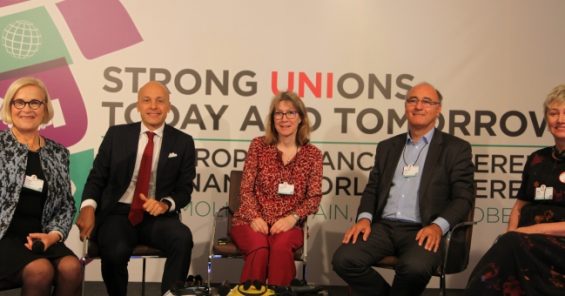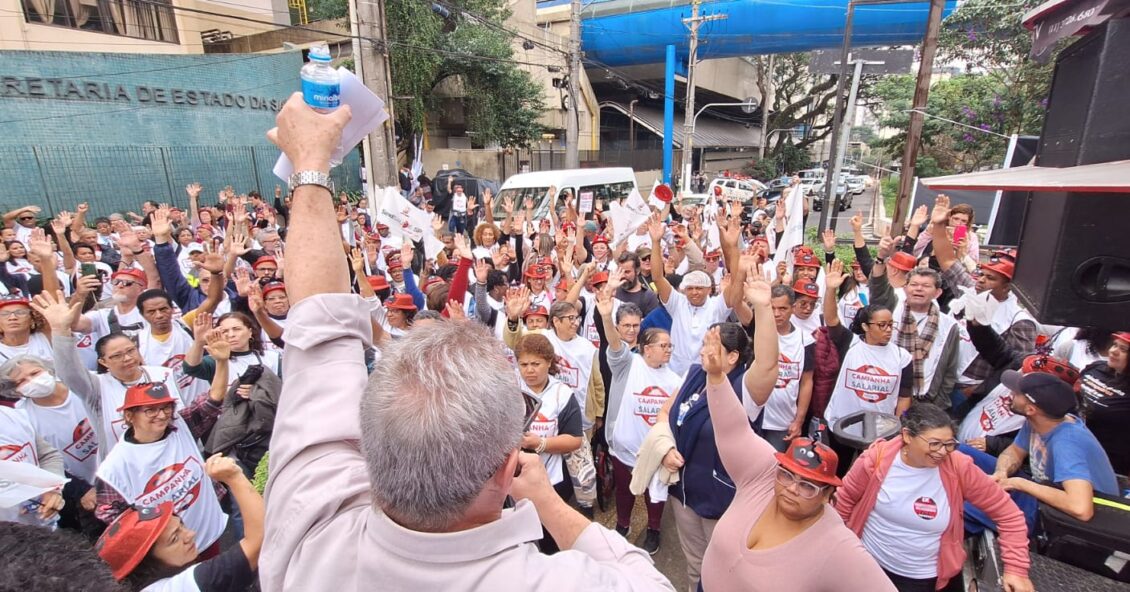Over 400 union activists from 72 countries kicked off the UNI Finance Global Conference in Torremolinos, Spain, with an in-depth discussion of using global agreements (GAs) as a foundation for building strong unions and worker power. Participants included leaders from UNI Global Union as well as high level management from UniCredit, Crédit Agricole and BNP Paribas, all recent signatories of ground breaking agreements with UNI.
In total, UNI Finance has signed, renewed, and re-signed global agreements with six multinational banks in the past year. Two additional agreements had been signed in past years.
“Global agreements are the future for responsible business.” said UNI General Secretary Christy Hoffman. “
“These agreements clarify some concrete steps that employers can take to make the rights to bargain and organize a reality. And I’m happy to say that in everyone of these agreements the banks have agreed that they will not oppose the process of forming unions, that they will allow workers a fair choice without interference from the employer – which is something we cannot take for granted in far too many countries. The agreements aren’t intended to implement only what the national laws require, but to go beyond national law if that is what it takes to secure these key rights. ”
The scope of these pacts has expanded to include more than the critical language on organizing and bargaining —especially in the finance sector. Each of the new agreements with the employers participating in the discussion contains some additional key provisions, such as language on maternity leave, digitalisation, the right to disconnect, sexual harassment, responsible sales or gender equality.
François Soudry, Social Policies Director of Crédit Agricole hoped that other companies would follow their example in signing agreements, saying, “Our company has a huge social impact, and we want to make sure that we are making a positive one. Right after signing the agreement, our [social] rating improved – this shows that global agreements can not only make a positive impact for our employees, but for the growth of the company.”
The agreement with Crédit Agricole notably has a provision on the impact of digitalization and data privacy. It is also intended to also prevent and combat any form of moral and/or sexual harassment, with clear and strict procedures to be put in place and full support offered to the victim.
Hoffman continued, “as the sector incorporates new technologies, its important that we establish that the unions will be at the table to negotiate a just transition.”
Catherine Staquet, BNP Paribas’ Head of Coordination of International Industrial Relations emphasised that the agreement was only the first step. “We have over 200,000 workers in over 70 countries, so the hard work starts now. Implementing the clauses of the global agreement represents a huge challenge – we agree that it should apply in all countries, but it will take time. Paris wasn’t built in a day.”
Staquet was asked about the bank’s plans to implement the agreement in the US- a country notorious for its anti- union culture and where managers are typically expected to be anti-union. She confirmed that the bank had already initiated training of its managers and that the agreement would apply in the US.
“No company can do business without thinking of the social consequences. It’s impossible for us to continue to operate without such an agreement in the future.”
In addition to the right to form a union free from fear, the BNP agreement with UNI promises paid 14 weeks of paid maternity leave and health and life insurance.
The UniCredit agreement secures human and labour rights and also contains provisions for responsible, sustainable sales and “work/life balance” for the bank’s 147,000 employees in 22 countries. The company was represented by Emanuele Recchia, Head of Labour Policies, Industrial Relations and Welfare. “This is something we’ve been working on for years,” he said. “We have to lead by example and the global agreement is a great source of stability and pride, for us as well as for our workers.”
Notably missing, given that the meeting was in Spain, was Santander. “We’d really like to see Santander joining the ranks of forward looking banks at our next conference,” said Angelo di Cristo Head of UNI Finance.
“Through global agreements, we are able to better protect workers all over the world,” said Rita Berlofa, World President of UNI Finance. “We’ve achieved a lot over the past four years — but there’s still a lot of work to be done. We need to make sure that our global agreements are implemented not only in the home country, but everywhere.”
“If we can break the non-union wall in the the US that would be a major achievement.”


